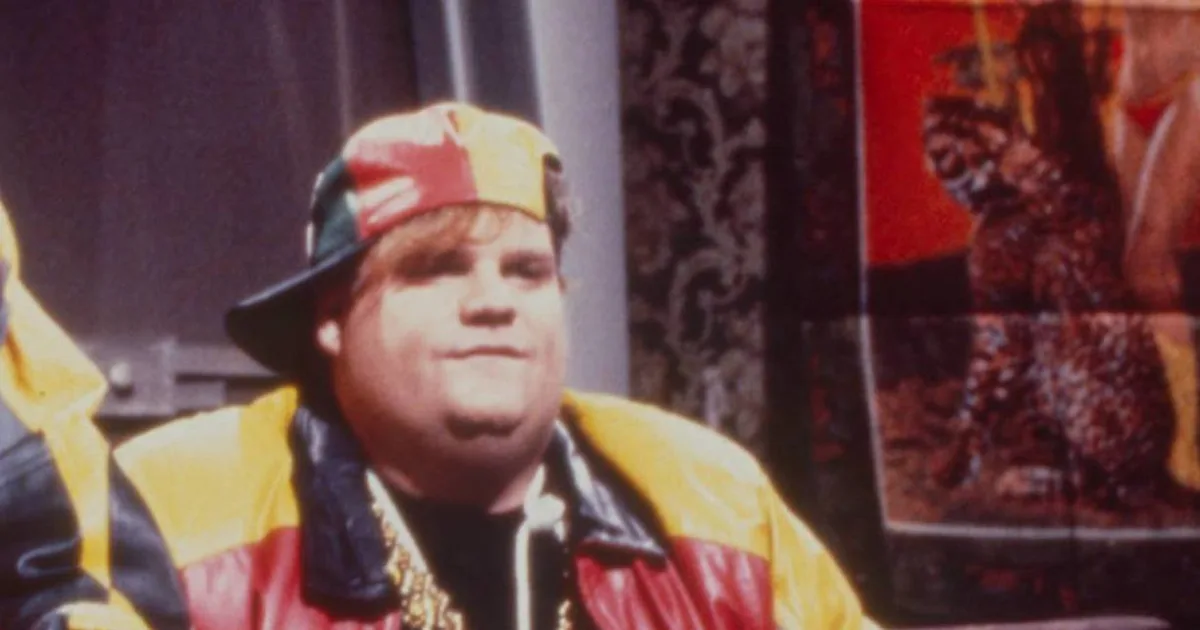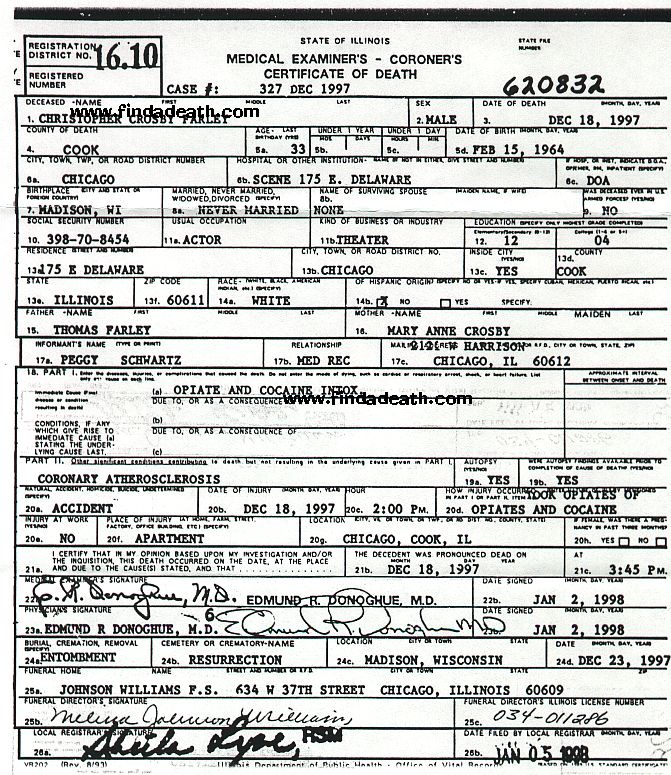Let me start by setting the mood here. Chris Farley was more than just a comedian—he was a legend in his own right. But today, we’re diving deep into one of the most haunting questions surrounding his life: what really caused Chris Farley’s death? This isn’t just another gossip piece; it’s an in-depth exploration of the circumstances that led to his untimely passing. Buckle up, because this is going to be raw, real, and straight from the heart.
Chris Farley left behind a legacy that still resonates with fans today. His performances on "Saturday Night Live" and movies like "Tommy Boy" cemented his status as one of the funniest people to ever grace our screens. But behind the laughter and the iconic roles, there was a darker side to his life—a struggle that ultimately claimed him at the young age of 33.
This article isn’t just about the facts. It’s about understanding the man, his battles, and the lessons we can learn from his story. So, whether you’re here for the truth or the closure, let’s break it down together.
Read also:Unlocking The Secrets Of Most A Comprehensive Guide To The Ultimate Power Word
Table of Contents
- Chris Farley Biography
- Early Life and Career Beginnings
- The SNL Years: A Rise to Fame
- Behind the Smile: The Struggles
- Chris Farley Cause of Death
- Details Surrounding His Death
- The Legacy He Left Behind
- Impact on Comedy
- Remembering Chris Farley
- Lessons from His Story
Chris Farley Biography
Before we dive into the tragic events, let’s take a step back and get to know the man behind the laughter. Chris Farley was born on February 15, 1964, in Madison, Wisconsin. He came from a family of seven kids, and his father owned a construction company. From a young age, Chris had a knack for making people laugh. His larger-than-life personality and comedic timing were evident even in his school days.
Personal Life at a Glance
| Full Name | Christopher Crosby Farley |
|---|---|
| Date of Birth | February 15, 1964 |
| Place of Birth | Madison, Wisconsin |
| Occupation | Comedian, Actor |
| Years Active | 1986–1997 |
| Cause of Death | Drug Overdose |
His career took off when he joined the Groundlings, a renowned improv troupe, and eventually landed him a spot on "Saturday Night Live." It was there that he became a household name, but as with many great talents, his personal life was far from perfect.
Early Life and Career Beginnings
Chris Farley’s journey to fame wasn’t an overnight success. He attended the University of Wisconsin-Madison, where he studied advertising but found his true passion in comedy. After college, he moved to Chicago and joined the famous Second City improv group. This was the beginning of his rise in the comedy world.
His big break came when he was cast on "Saturday Night Live" in 1990. His characters, like Matt Foley and the Motivational Speaker, became instant classics. Fans couldn’t get enough of his over-the-top energy and hilarious antics. But behind the scenes, Chris was battling personal demons that would eventually catch up to him.
The SNL Years: A Rise to Fame
During his time on SNL, Chris Farley became a fan favorite. His performances were nothing short of legendary. But it wasn’t all smooth sailing. Chris struggled with weight issues and often used his appearance as a punchline. While it worked for his comedy, it took a toll on his self-esteem.
His collaboration with fellow SNL cast member David Spade led to some of the most iconic sketches in the show’s history. However, the pressures of fame and the fast-paced lifestyle of showbiz began to weigh heavily on him. This period marked the beginning of his descent into addiction.
Read also:Original Programming The Future Of Content Creation Thats Got Everyone Talking
Behind the Smile: The Struggles
Chris Farley’s public image was one of a jovial, larger-than-life character. But in reality, he was dealing with severe addiction issues. He battled both alcoholism and drug abuse throughout his career. Despite several attempts at rehab, he found it difficult to stay clean.
Key Struggles
- Alcohol addiction
- Drug abuse, particularly cocaine and morphine
- Self-esteem issues tied to his weight
- Pressure to maintain his image as a comedic genius
Friends and colleagues have spoken about how Chris would often joke about his addictions, using them as material for his comedy. But beneath the laughter, there was a man crying out for help.
Chris Farley Cause of Death
On December 18, 1997, the world lost a comedic genius. Chris Farley was found dead in his Chicago apartment at the age of 33. The official cause of death was a cocaine and morphine overdose. Autopsy reports revealed that he had a lethal combination of these drugs in his system.
It’s important to note that Chris had been working on his sobriety and even completed a stint in rehab just months before his death. Unfortunately, the grip of addiction proved too strong, and it claimed him far too soon.
Details Surrounding His Death
The events leading up to Chris Farley’s death paint a picture of a man who was trying but ultimately couldn’t break free from his struggles. Here’s a breakdown of what happened:
- Chris had been in and out of rehab multiple times, seeking help for his addiction.
- He was reportedly in a good place mentally and was excited about upcoming projects.
- On the night of his death, he was alone in his apartment, which tragically became the scene of his fatal overdose.
Friends and family were devastated by the news, and the comedy world lost one of its brightest stars. Chris Farley’s death served as a wake-up call for many about the dangers of addiction and the importance of seeking help.
The Legacy He Left Behind
Even though Chris Farley’s life was cut short, his legacy lives on. His performances continue to entertain new generations, and his impact on comedy is undeniable. Shows like "Saturday Night Live" and movies like "Black Sheep" and "Tommy Boy" remain fan favorites.
His influence extends beyond entertainment. Chris’s story has inspired countless individuals to seek help for their own struggles with addiction. His untimely death was a reminder that even the brightest stars can fall prey to the darkness within.
Impact on Comedy
Chris Farley’s comedic style was unique and unforgettable. He brought a level of physical comedy and heartfelt performances that set him apart from his peers. His ability to make people laugh while also touching their hearts was a rare gift.
Comedians who followed in his footsteps often cite him as an inspiration. His work paved the way for a new generation of comedians who aren’t afraid to be vulnerable and real in their performances.
Remembering Chris Farley
Every year, fans gather to remember Chris Farley and celebrate his life. Events like the "Chris Farley Film Festival" keep his memory alive and ensure that his contributions to comedy are never forgotten.
His family has also played a role in preserving his legacy. They’ve spoken openly about his struggles and the lessons they’ve learned from his story. It’s a testament to the impact he had on those around him.
Lessons from His Story
Chris Farley’s life and death offer valuable lessons for all of us. Here are a few takeaways:
- Addiction doesn’t discriminate. It can affect anyone, no matter how successful or loved they are.
- Seeking help is a sign of strength, not weakness.
- It’s important to address mental health issues and not hide behind a mask of happiness.
- Support your loved ones who are struggling and encourage them to get the help they need.
Chris Farley’s story is a reminder that even in the darkest times, there is hope. It’s up to us to carry his legacy forward and ensure that his message of resilience and authenticity continues to inspire.
Final Thoughts
In conclusion, Chris Farley’s cause of death was a tragic result of the battles he faced with addiction. But his life was so much more than that. He was a gifted comedian whose work brought joy to millions. As we reflect on his story, let’s honor him by learning from his experiences and extending a helping hand to those in need.
So, here’s what I want you to do: share this article, start a conversation, and keep Chris Farley’s memory alive. Let’s make sure his story isn’t just remembered but also acts as a catalyst for positive change.


